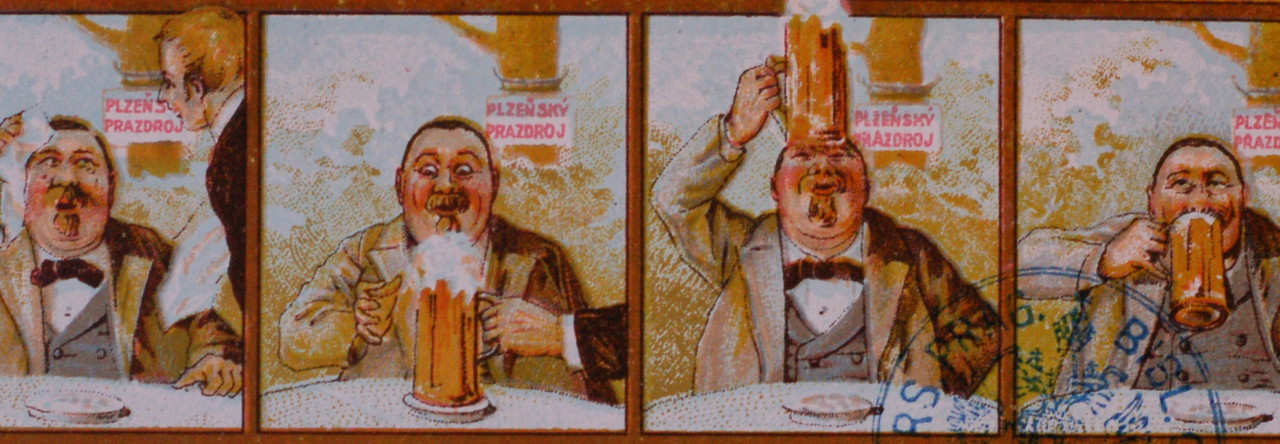
Heineken announced yesterday that it is taking over the four great brands of the Czech Republic’s Drinks Union brewery group (Zlatopramen, Velké Březno, Louny and Kutná Hora), which have an overall market share of 4%. The takeover will make Heineken the third-largest player in the Czech market after SAB-Miller and InBev, bumping Budvar to fourth place.
It’s not exactly a surprise — news of the proposed sale was floated last autumn — but it still caused ripples across the small pond of the beer world: within a few hours I was contacted by friends at CAMRA about the purchase, and EBCU members apparently all got the message via email. Back here at home, Pivní deník reported the story, posing some interesting questions.
To paraphrase: If Heineken decides to close some of its newly acquired breweries in the name of streamlining and efficiency, who will be the first? Louny, which is closest to Krušovice, which already has plenty of unused brewing capacity? Or Kutná Hora, which Drinks Union doesn’t actually own but only rents from the town? Or one of the twinned breweries of Zlatopramen and Velké Březno? Would two breweries in the same town really survive a takeover by such a major international brewing group?
No one in the know has breathed a word. Here’s what we have so far: Heineken’s market share just jumped to around 12–14%. Newspapers have quoted Jiří Fusek, head of the association of Small and Independent Breweries, as saying that Heineken is likely to seek more acquisitions here, according to Prague Daily Monitor’s Czech press review (subscription required). Heineken already owns Krušovice, Hostan, Starobrno and Zlatý Bažant in Slovakia. They’ve been pushing their own beer in local supermarkets, which are conveniently owned by a company back in Holland.
We also know what happened to the Starobrno brewery after Heineken’s purchase there: a lot more money was invested in image, creating new logos, cleaning up the premises and renovating the on-site bars and restaurants (including a new, upper-level Heineken bar, pictured above — metaphorically suggesting that Heineken exists on a level above Czech beers, apparently in a place with lots of plants). Beyond the new paint and furniture, some believe that the taste of Starobrno has improved under Heineken’s ownership, though that’s hardly an achievement, considering that beer’s reputation before the sale.
Perhaps a more important question is this: Why does it matter? What difference does it make if foreign conglomerates purchase small Czech brewers?
One reason has to do with economics: foreign companies tend to do something called repatriation of profits, which is to say that if people here spend their money on a beer that is owned by a foreign company, the profits from that purchase are distributed and reinvested somewhere else far away. (Multiply this by enough beers and a large enough market share and you end up with the entire Czech nation sending a not-insignificant part of its income straight to Holland. I’ll take pains to point out that this is still a transitional economy — if you’ve seen the roads in the Czech lands, you know that our money is needed here.)
Another reason is that many significant decisions for these breweries are going to be made at the head offices in the conglomerate’s home country. That means that the decisions about how to brew a Czech Pilsner-style beer are going to be made by a company that thinks Heineken is a Pilsner-style beer. And Heineken doesn’t really compare.
A related reason has to do with the vitality and variety of our beer culture. Will those who have purchased Heineken’s shares on Amsterdam’s Euronext exchange really want the company to keep brewing oddball lagers like Velké Březno’s excellent Doppel-Doppel Bock? The name of the game for large brewing groups is increasing profit through larger market share and greater efficiency. Diverse product lines and redundant breweries with excess capacity are inefficient. Invariably some breweries and some unusual beers will be shuttered. The winners will be the shareholders, who will see more profits. The losers will be the consumers, who will have fewer choices.
At one of the recent tastings at Pivovarský klub, Aleš Dočkal mentioned a scenario whereby every Czech town of any size would have a brewpub — and in the entire country there will be only four or five large brewers distributing a handful of similar beers in kegs and bottles. That scene hasn’t arrived just yet. But we might have just watched the opening credits.




Pivero
In today’s piece in the free financial daily E15, it seems that Velké Březno is going to go down first. Unfortunately. And I would dare say that Kutná Hora is to follow. I don’t think Heineken will be renting the brewery for much longer given that they have unused capacity in Louny and they want to doulble the capacity of Krušovice.
I think I will start stocking on Drinks Union beers before they start to dissappear one by one.
The article also hints at Heineken approaching PMS (Holba, Zubr and Litovel) to get their hands into that group as well.
Evan Rail
It’s either them or K Brewing Group.
Also, this probably means that the Vietnamese brewery that ripped off Velké Březno’s Zippich logo can rest easy…
Pivero
I don’t think the brand will dissappear. I think it will be something like Staropramen-Braník thing, with the production of Březňák shifted to Zlatopramen. If that turns out to be the case, I bet mir Zippich’s brand will have the same luck as that of Prague 4. We can only hope that Zlatopramen (which has greatly improved) will not suffer the same fate as Staropramen.
Still, as I’ve mentioned some time ago in my blog. Heineken seems to be taking things differently than InBev.
Starobrno is a fine beer (their green Easter beer is pretty drinkable) and they are rolling out the tanks with Krušovice. In fact, I’ve had some Krušovice lately and their quality seems to have improved. But then, it couldn’t get any lower, at least now they are not mixing leftovers from Radeberger as their previous owners used to do.
One way or another, the biggest issue here is that breweries will start to close down and some products that aren’t interesting to shareholders will be history…..
David
This is just so bad. I am not a fan of Heineken corporate machine (or their ‘beer’ for that matter), just take a look at the Slovak breweries they ate to see what will probably happen. Whilst the brands have not gone, they have consolidated their multiple brewery operations at a single site and closed down some of Slovakia’s older breweries – Corgon brewing, for example, was moved from its original brewery site to the Zlaty Bazant brewery in another town.
Its a pity that the Czech breweries couldn’t get together to fend off the outside attacks. On the other hand does it allow for new, smaller breweries to spring up in these towns?
Pivero
I don’t think Heineken is an outside attack. It’s just the owners of Drinks Union accpeting a juicy bunch of money from a foreign company.
More interesting will be the development of Budvar’s privatisation, here the owner is the state (which is all of us taxpayers here) and their duty will be to sell the company to someone who won’t buy it just for a quick profit.
Interesting question at the end of your comment, David. I’m not very optimistic about it. I’m not sure how well the breweries in Kutná Hora and Louny are doing locally, but if I had to bet, I would put my money on Stella Artois or Staropramen being easier to find than the local brews, and that is not a good sign.